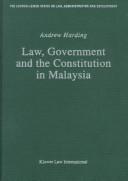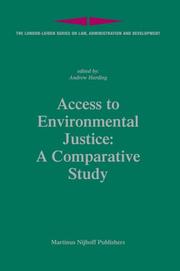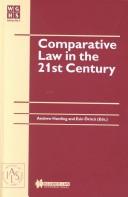| Listing 1 - 10 of 23 | << page >> |
Sort by
|

ISBN: 9041109188 9789041109187 Year: 1996 Publisher: The Hague : Kluwer law international,
Abstract | Keywords | Export | Availability | Bookmark
 Loading...
Loading...Choose an application
- Reference Manager
- EndNote
- RefWorks (Direct export to RefWorks)
Book
ISBN: 1509955690 1841139718 Year: 2012 Publisher: London, England : [London, England] : Zed Books, Bloomsbury Publishing,
Abstract | Keywords | Export | Availability | Bookmark
 Loading...
Loading...Choose an application
- Reference Manager
- EndNote
- RefWorks (Direct export to RefWorks)
"Malaysia's constitution was set at the independence of the Federation of Malaya in 1957 along the lines of the Westminster model, embracing federalism and constitutional monarchy. That it has endured is explained in terms of the social contract agreed between the leaders of the three main ethnic groups (Malay, Chinese, Indian) before independence. However, increasing ethnic tension erupted in violence in 1969, after which the social contract was remade in ways that contradicted the basic assumptions underlying the 1957 Constitution. The outcome was an authoritarian state that implemented affirmative action in an attempt to orchestrate rapid economic development and more equitable distribution. In recent years constitutionalism, as enshrined in the 1957 Constitution but severely challenged during the high-authoritarianism of Prime Minister Tun Dr Mahathir Mohamad's developmental state, has become increasingly relevant once again. However, conflict over religion has replaced ethnicity as a source of discord. This book examines the Malaysian approach to constitutional governance in light of authoritarianism and continuing inter-communal strife, and explains the ways in which a supposedly doomed colonial text has come to be known as 'our constitution'"--P. [4] of cover.
Constitutional law --- Constitutional history --- Constitutional & administrative law --- Malaysia. --- Malaysia --- Politics and government --- Constitutional history, Modern --- Constitutions --- History
Book
ISBN: 9781529405583 9781529405590 9781529405613 Year: 2020 Publisher: London Maclehose Press
Abstract | Keywords | Export | Availability | Bookmark
 Loading...
Loading...Choose an application
- Reference Manager
- EndNote
- RefWorks (Direct export to RefWorks)
Book
ISBN: 9781509927432 Year: 2022 Publisher: Oxford Hart Publishing
Abstract | Keywords | Export | Availability | Bookmark
 Loading...
Loading...Choose an application
- Reference Manager
- EndNote
- RefWorks (Direct export to RefWorks)

ISBN: 1281926353 9786611926359 9047420454 9789047420453 9004157832 9789004157835 9789004157835 Year: 2007 Publisher: Leiden Boston Martinus Nijhoff Publishers
Abstract | Keywords | Export | Availability | Bookmark
 Loading...
Loading...Choose an application
- Reference Manager
- EndNote
- RefWorks (Direct export to RefWorks)
Although it is commonly asserted that enhanced citizen participation results in better environmental policy and improved enforcement of environmental standards, this hypothesis has rarely been subject to testing on a comparative basis. The contributors to this book set out to study the extent to which citizens can and do exert influence over their urban environments through the legal (and extra-legal) 'gateways' in eleven countries spanning several continents as well as different climates, levels and type of economic development, and national legal and constitutional systems, as well as exhibiting a different set of environmental problems. One interviewee questioned about access to environmental justice, dryly remarked that in his city there was no environment, no justice and no access to either. Yet this view, as will be seen, requires to be nuanced. While few people will be surprised by the finding that legal gateways to environmental justice are largely ineffective, the reasons for this are revealing; but also the richness of detail and the comparisons between the different countries, and also the positive aspects which surfaced in several instances, were indeed both encouraging and sometimes surprising. This book presents the first comparative survey of access to environmental justice, and will be of considerable use to lawyers, policy-makers, activists and scholars who are concerned with the environmental issues which so profoundly affect and afflict our habitat and conditions of social justice throughout the world.
Environmental law. --- Environmental justice. --- Environmental policy.
Book
ISBN: 9781841139715 Year: 2012 Publisher: Oxford Hart publishing
Abstract | Keywords | Export | Availability | Bookmark
 Loading...
Loading...Choose an application
- Reference Manager
- EndNote
- RefWorks (Direct export to RefWorks)
Constitutional history --- Constitutional law --- Malaysia. --- Malaysia --- Politics and government
Book
ISBN: 900463309X Year: 1996 Publisher: Boston : BRILL,
Abstract | Keywords | Export | Availability | Bookmark
 Loading...
Loading...Choose an application
- Reference Manager
- EndNote
- RefWorks (Direct export to RefWorks)
Book
ISBN: 9781841139722 Year: 2011 Publisher: Oxford Hart publishing
Abstract | Keywords | Export | Availability | Bookmark
 Loading...
Loading...Choose an application
- Reference Manager
- EndNote
- RefWorks (Direct export to RefWorks)

ISBN: 904119875X 9789041198754 Year: 2002 Publisher: London : Kluwer Law International,
Abstract | Keywords | Export | Availability | Bookmark
 Loading...
Loading...Choose an application
- Reference Manager
- EndNote
- RefWorks (Direct export to RefWorks)
Comparative law --- Comparative jurisprudence --- Comparative legislation --- Jurisprudence, Comparative --- Law, Comparative --- Legislation, Comparative --- Comparative law. --- Congrès. --- Droit comparé. --- Rechtsvergelijking. --- Rechtsontwikkeling. --- Europese integratie. --- Droit comparé --- Kongress. --- Rechtsvergleich.
Book
ISBN: 1108163904 1108173691 110719508X 1316646661 1108168876 Year: 2018 Publisher: Cambridge : Cambridge University Press,
Abstract | Keywords | Export | Availability | Bookmark
 Loading...
Loading...Choose an application
- Reference Manager
- EndNote
- RefWorks (Direct export to RefWorks)
The founding of a constitutional court is often an indication of a chosen path of constitutionalism and democracy. It is no coincidence that most of the constitutional courts in East and Southeast Asia were established at the same time as the transition of the countries concerned from authoritarianism to liberal constitutional democracy. This book is the first to provide systematic narratives and analysis of Asian experiences of constitutional courts and related developments, and to introduce comparative, historical and theoretical perspectives on these experiences, as well as debates on the relevant issues in countries that do not as yet have constitutional courts. This volume makes a significant contribution to the systematic and comparative study of constitutional courts, constitutional adjudication and constitutional developments in East and Southeast Asia and beyond.
Constitutional courts --- Courts, Constitutional --- Courts, Supreme --- Supreme courts --- Courts of special jurisdiction --- Courts of last resort
| Listing 1 - 10 of 23 | << page >> |
Sort by
|

 Search
Search Feedback
Feedback About UniCat
About UniCat  Help
Help News
News